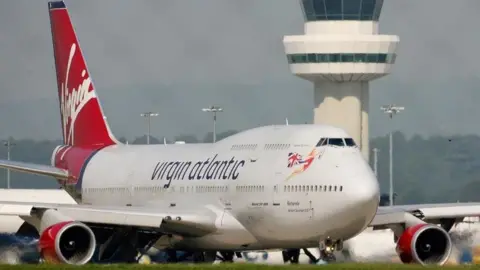Should I offset my summer holiday flights?
 Getty Images
Getty ImagesFlying off somewhere nice this summer? Now feeling guilty? You wouldn't be alone.
The continuing campaign by teenage climate activist Greta Thunberg to get everyone to reduce their carbon emissions has prompted some soul-searching over when, and whether, it is OK to fly.
In Scandinavia there is even a word for it - "flygskam" - flight shame.
If you don't want to add to the carbon in the atmosphere, you could, like Greta, take the train instead.
But if you are have already booked your fight, or if flying is the only way of getting to your destination, you can instead donate to a carbon offsetting scheme.
These allow individuals and businesses to give money to environmental projects around the world in order to balance out their carbon footprints.
 Atmosfair
AtmosfairSo for example, if you fly from London to New York, you can contribute to a scheme that plants trees, or helps people in an African country get more efficient cooking stoves.
You can either do this via your airline, or pick one of the growing number of stand-alone organisations that run carbon offsetting schemes.
But how do you choose a scheme that has meaningful impact? It is an important question because offsetting is controversial. Some critics have dubbed it a "licence to pollute", arguing that it is likely to ease your conscience and make you happier about booking another flight.
And some offsetting schemes have been criticised in the past for not being effective. Yet despite this criticism, demand for offsetting is soaring.

What is offsetting?
First you calculate how much carbon you've emitted. Then you buy an "offset".
These are part shares in projects that work to reduce carbon being emitted elsewhere, usually in poorer parts of the world.
These can be schemes to plant trees, install renewable energy technology, or to change people's lifestyles, such as providing them with more fuel-efficient cooking equipment.
This way, if you have emitted a tonne of carbon, in theory at least, you have ensured a tonne of carbon hasn't been emitted somewhere else.

Many airlines do run their own schemes, but they often come in for criticism for not pressing home the environmental message strongly enough. Virgin Atlantic runs its programme in partnership with a reputable offsetting company called ClimateCare.
Unlike some of its rivals, Virgin's offsetting scheme doesn't come up automatically as an option when you buy a ticket. You have to scroll right to the bottom of the page and click on the sustainability tab, it then offers a simple calculator where you can type in your journey and find out how much to pay.
Emma Harvey, Virgin Atlantic's head of sustainability, says the firm has tried to make the scheme as flexible and user-friendly as possible, but "customer offsetting is one small part of a much bigger picture where there have been huge developments over the last 10 years".
 PA Media
PA MediaInstead of focusing on offsetting, Virgin prefers to emphasise its efforts to limit carbon emissions, through buying more fuel-efficient aircraft, reducing the weight of onboard equipment, and exploring alternative, sustainable fuels.
By contrast, German carbon offsetting organisation Atmosfair provides customers with quite a bit more information about the impact of their flight.
As well as an online calculator it reminds you that an economy class return flight from London to New York produces an average 2,726kg of carbon dioxide per person. That is more than the average amount released per year by a typical car - 2,000kg.
It also gives a vivid visualisation showing that emissions from that one flight will dwarf the annual emissions of a person in India.
It's a sobering experience. But that is the point says spokeswoman Julia Zhu. Offsetting is not supposed to salve consciences, or act as a get-out-of-jail-free card.
"Every serious offsetting organisation really stresses it is better to avoid emissions when you can," she says. "It's always better not to fly. But flying and offsetting is better than flying and not offsetting."
 CO2logic
CO2logicAtmosfair calculates that the cost of offsetting that return journey between the UK and US would be €63 ($71; £57). This is significantly higher than on Virgin's calculator, though that may be because Virgin's flights are less polluting than the average. Atmosfair also publishes an index which compares airlines' efficiency, so customers can choose the airline with lowest emissions.
Ms Zhu hopes this kind of information will help exert pressure on the airlines to do more over climate change.
But it's not just in the messaging that carbon offsetting has proved controversial. In the past some carbon offsetting schemes have been criticised for backing projects that did not deliver on the results they promised. Sometimes this was because equipment broke, or people didn't continue to follow the programme on the ground. In other cases projects didn't work in the interests of locals or the local environment.

Global Trade

To ensure that people chose a decent provider, Edward Hanrahan, chief executive of ClimateCare, says is it important that to "look for reputable players with accreditation from one of the big monitoring organisations".
Both ClimateCare and Atmosfair projects are accredited by a Swiss organisation called Gold Standard. Other accreditors included American Carbon Registry, Climate Action Reserve and Verified Carbon Standard.
"We've learned what works, what doesn't," says Sarah Leugers from Gold Standard. "We've reviewed and revised our rules, increased the rigour of our requirements."
Ms Leugers says luckily the early "wild west" days in the industry are now over, and that plenty of offsetters meet Gold Standard's criteria, which include UN sustainable development goals, such as protection of human rights and the local environment.
 Getty Images
Getty ImagesSo the debate has now shifted to what kind of projects are the most useful. Traditionally schemes have focused on projects overseas concentrating on the production and distribution of fuel-efficient cook stoves, rainforest preservation schemes, or wind and solar power schemes.
But increasingly offsetters are branching out into new technologies and - since low income countries are taking on more responsibility for their own carbon emissions - on projects closer to home.
Customers of the Swiss offsetting organisation MyClimate.org, can choose between traditional overseas offsets and projects in Switzerland. These include things like installing energy saving shower heads, and remote control of the heating systems, in Alpine holiday homes. They're not the sort of thing usually associated with offsetting, but MyClimate's Kai Landwehr says the change wouldn't happen without the subsidy.
But in the end the quest for an easy conscience may turn out to be solved more easily simply by next year swapping your Flygskam for the new Scandinavian buzzword - tagskryt, because in the end "train brag" comes with a lot less baggage.
